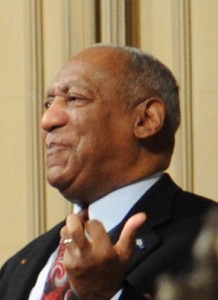This week, comedian Bill Cosby resigned as a trustee of Temple University in Philadelphia, on whose board he sat 32 years.

The Philadelphia Inquirer reports the decision came after a petition drive and other pressure on the performer’s alma mater, which followed a flurry of news this fall on years’-old allegations of sexual assaults, for which Cosby never has been charged. The newspaper stated Dec. 1 that “at least 20 women” have accused him of drugging then having sexual relations with them.
Cosby, 77, said he resigned because “I have always wanted to do what would be in the best interests of the university and its students.”
Where do the Cosby allegations fit in journalism ethics? Media critics have noted the standard for entertainment journalism, where Cosby stories usually run, can be softer.
Yet the accusations have not been hidden. When the performer was sued, it was reported. When responsible media have published or aired general profiles of Cosby, the allegations have been included.
In November, two respected journalists have written that they wished they had placed more emphasis on this aspect when they wrote about him.
- “Calling Out Bill Cosby’s Media Enablers, Including Myself,” by David Carr, The New York Times, Nov. 24. Carr in 2011 was penning a profile for an airline in-flight magazine, where he never mentioned the claims although he knew of them.
- “The Cosby Show — Declining to Seriously Reckon with the Rape Allegations against Him Is Reckless. And I Was Once Reckless” by Ta-Nehisi Coates, The Atlantic, Nov. 19. Coates in 2008 was exploring Cosby’s campaign to boost the morale, and morals, of young blacks. Coates noted the claims in his article.
The ethics lesson here is balance but also appropriateness.
As an example, charges Bill Clinton perjured and concealed his “relations” with Monica Lewinsky brought about his 1998 impeachment in the House and the Senate’s acquittal in 1999. General profiles on the former president in the years since devote some space to the topic. Focused journalism, however, such as interviews targeting his views on foreign relations or his nonprofit works, give it no coverage.
Neither Carr nor Coates state in their commentaries that they should’ve confronted Cosby but that they wished they had done more research. That makes the following headlines curious.
- “Bill Cosby Stays Silent amid New Allegations,” USA Today, Nov. 23
- “What I Wish I’d Asked Bill Cosby: How I learned that Entertainment Journalists Can Play Hardball Too,” Salon.com, Nov. 20
- “Bill Cosby Tries to Pressure an AP Reporter Into Editing Out Rape Allegations,” Newsweek, Nov. 20
- “Bill Cosby Will Not Comment on Sexual Assault Allegations, Says Lawyer,” Variety, Nov. 16
- “In NPR Interview, Cosby Declines to Discuss Assault,” NPR, Nov. 15
Strong reporting includes interviewing all parties involved. Yet what is Bill Cosby going to say in 2014? Yes he did? No he didn’t? Something in between? If he spoke — he only issued a statement about his Temple resignation — would readers, listeners and viewers believe him?
Ethical journalists realize the Fourth Estate has no judiciary power, although the “court of public opinion” has thrived throughout history. That body has no Bible for sworn testimony; that’s what journalistic fact-finding is for.
Reporters have to be resolute with their subjects, from crime exposes to Hollywood features. If commentators are shocked, shocked that Cosby asked to the point of veiled threats for the AP reporter to cut the scandal part of their video discussion, they conveniently forget sources at all levels try to manipulate their stories.
Solid journalism, however, means more than mike-in-the-face: What did happen between Cosby and these women? Where was law enforcement at the time? What can be discovered from the civil litigation some of the women attempted? How did media mishandle the claims when they were first made?
Coates elaborates on his essay in a 7-minute audio podcast from NPR’s On the Media. Bill Wyman asks in The Columbia Journalism Review, “Where Were the Journalists 10 Years Ago?”
• • •
Note: While finished Dec. 4, 2014, this Brick was published the evening of July 18, 2015.
